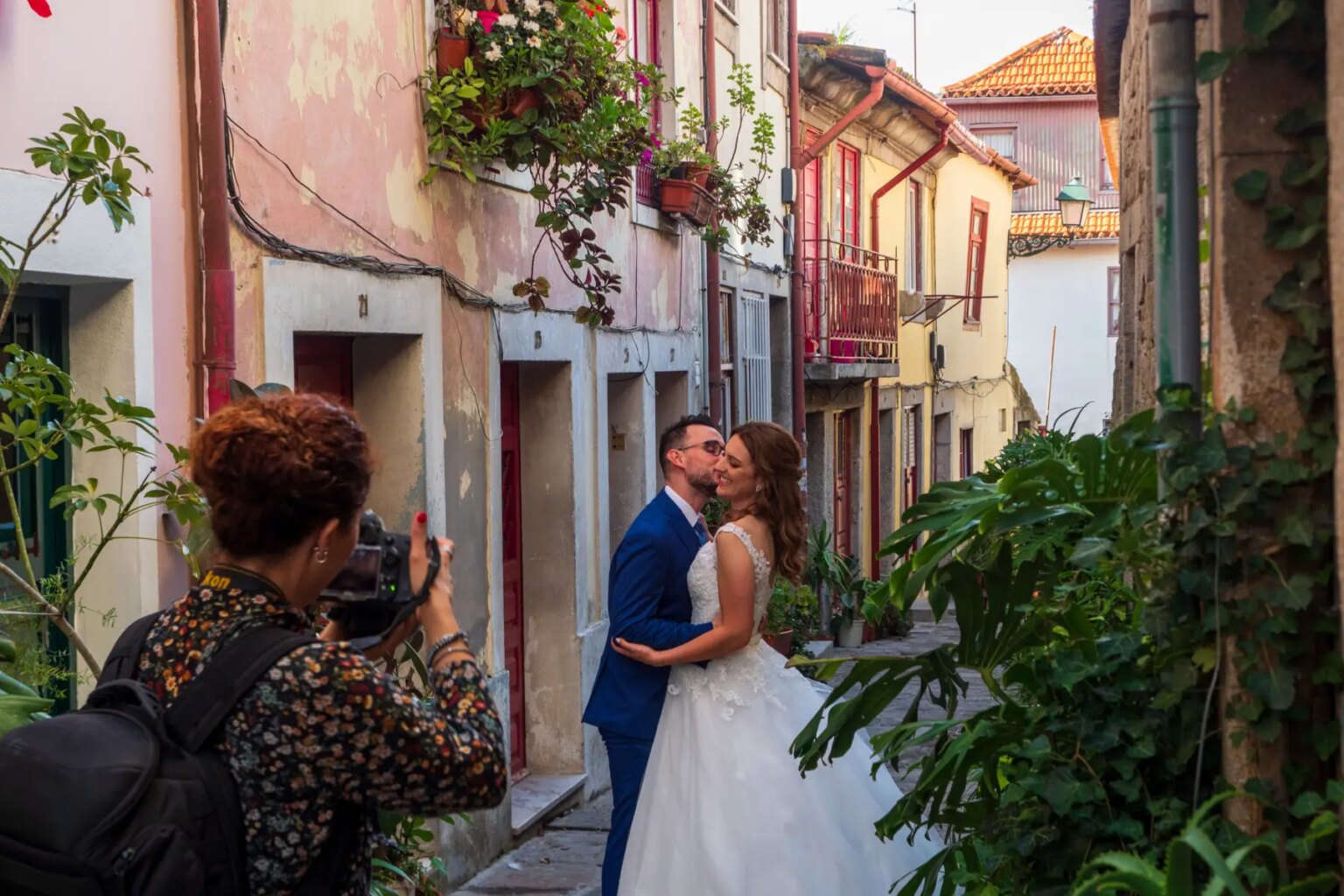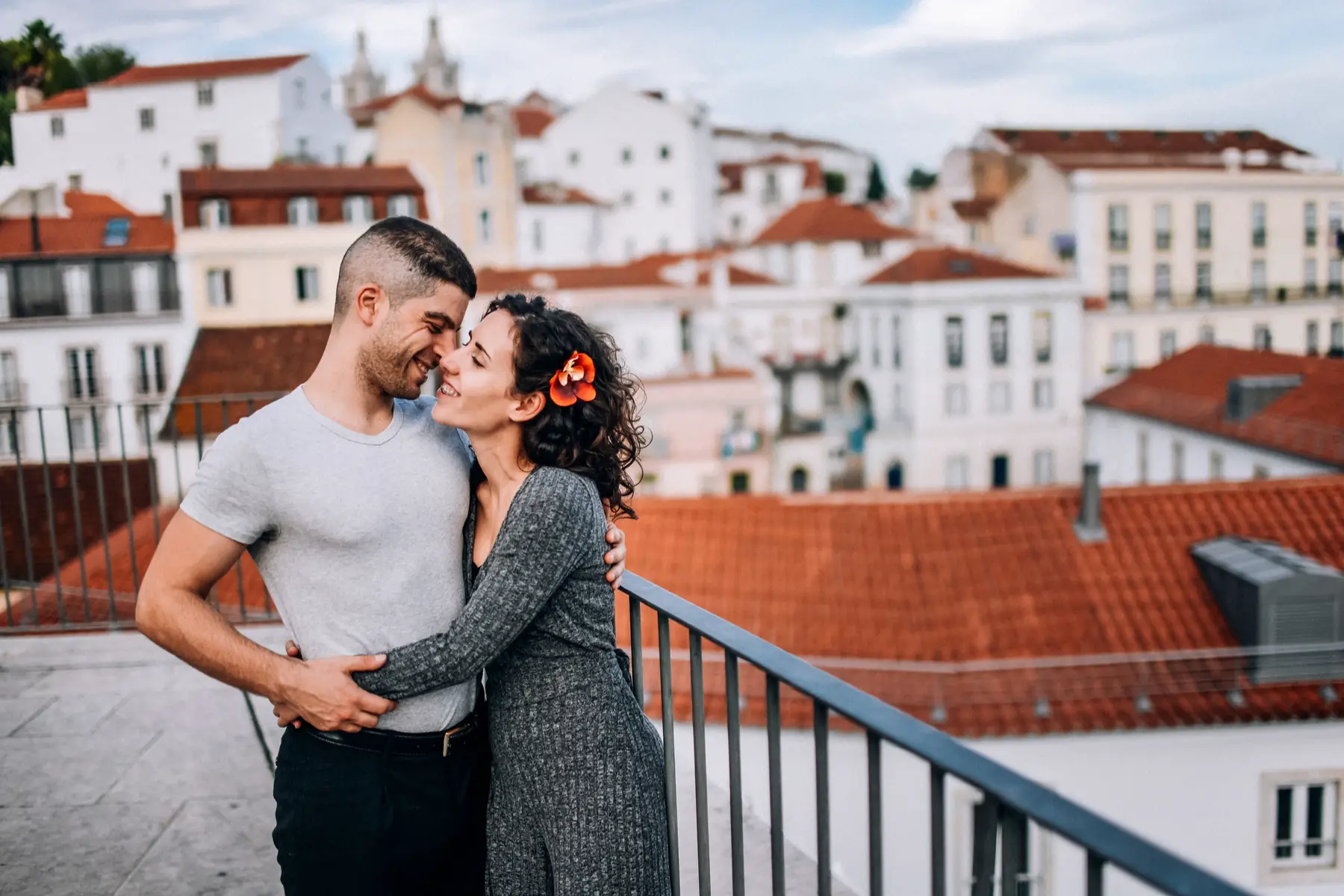Getting married in Portugal can look very different depending on the type of ceremony you choose to have. For a long time, church weddings were the norm, however, civil ceremonies are quickly taking over. While gathering and submitting all the required paperwork can be time-consuming, it will all be worth it once you’re exchanging your vows by the beach or enjoying your first dance as a married couple inside a palace.
In this helpful guide, we explain all the steps you need to take to arrange your dream wedding in Portugal, including the following:
Cigna Global
Enjoy peace of mind while living in Portugal with Cigna Global’s long-term international health insurance plans (12+ months). Get tailored coverage, direct billing with many providers, complex case management, and global care on demand, with access to a network of 1.5+ million doctors, specialists, and therapists.
An overview of marriage in Portugal
While marriage used to be a stepping stone in most people’s lives in Portugal, it is no longer a prerequisite. In fact, statistics show that there has been a steady decline in the total number of marriages over the past two decades; dropping from 63,752 in 2000 to 33,272 in 2019, before the coronavirus pandemic hit. According to a 2019 study by Eurostat, Portugal is also among the countries with the lowest marriage rates in the EU; alongside Italy, Slovenia, France, Spain, and Luxembourg.
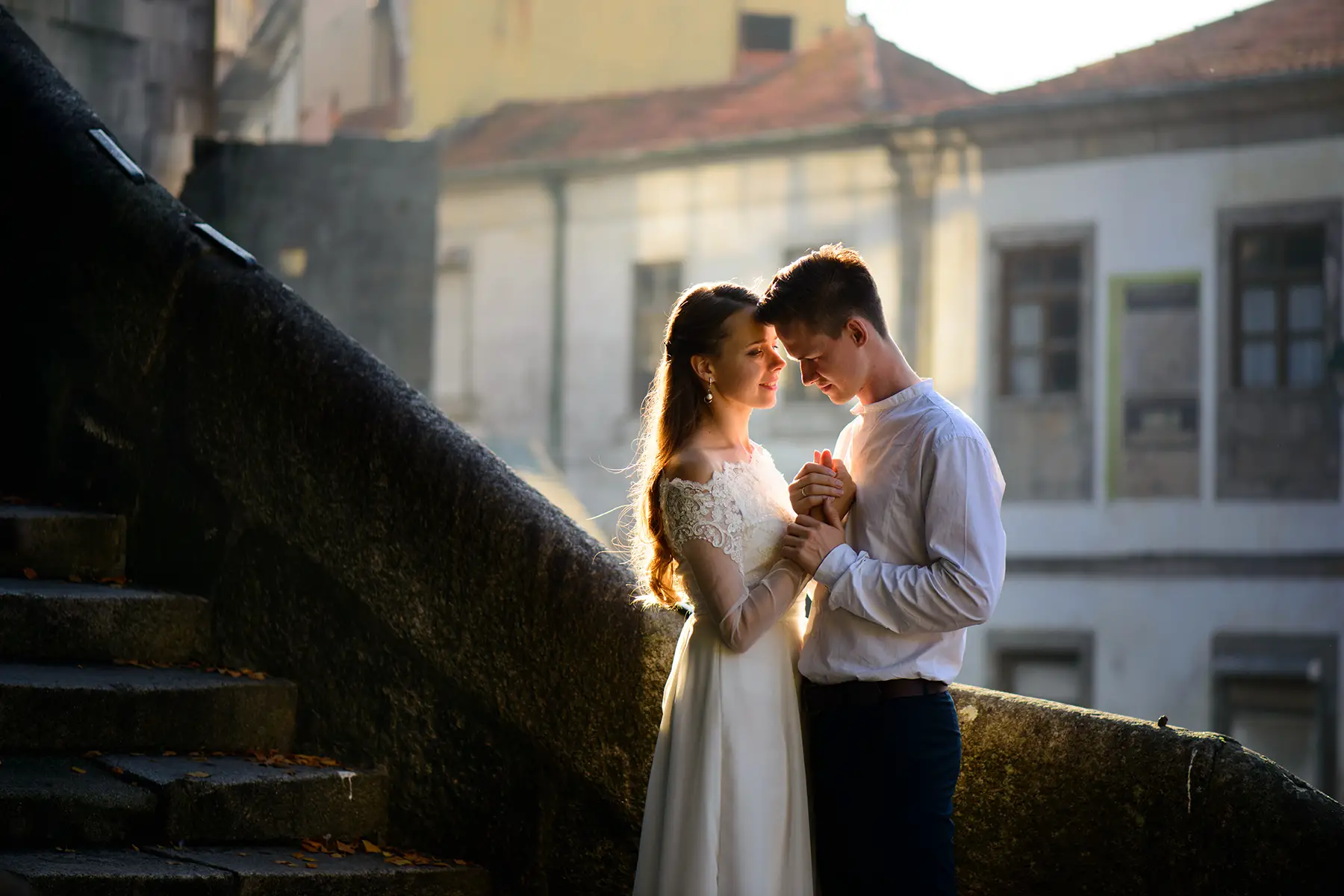
Many couples in Portugal are also delaying the occasion until they find a stable job and can afford to buy or rent a place of their own. In 2000, the average age at first marriage in Portugal was 27.5 for men and 25.7 for women. However, this rose to 33.9 for men and 32.4 for women in 2019.
A shift away from religious weddings
Catholic weddings were once the top choice for couples in Portugal, however, this tradition is slowly fading away. Of the 33,272 weddings hosted in 2019, for instance, more than half were civil ceremonies. And 61.1% of these couples were already living together before tying the knot, which is a growing trend in recent years.
Many Portuguese couples are also opting for a domestic partnership. While this provides similar rights to marriage, such as tax benefits, it may not offer you the same protection as a divorce in the case of a separation. Couples in these unions also have a harder time when it comes to dealing with things like property inheritance and child custody.
Attitudes towards marriage in Portugal
Overall, marriage in Portugal is slowly losing ground to cohabitation, and domestic partnerships are often the first step in a Portuguese relationship. An increasing number of young couples are getting engaged after living together for a period of time first, resulting in marriage later on in life.
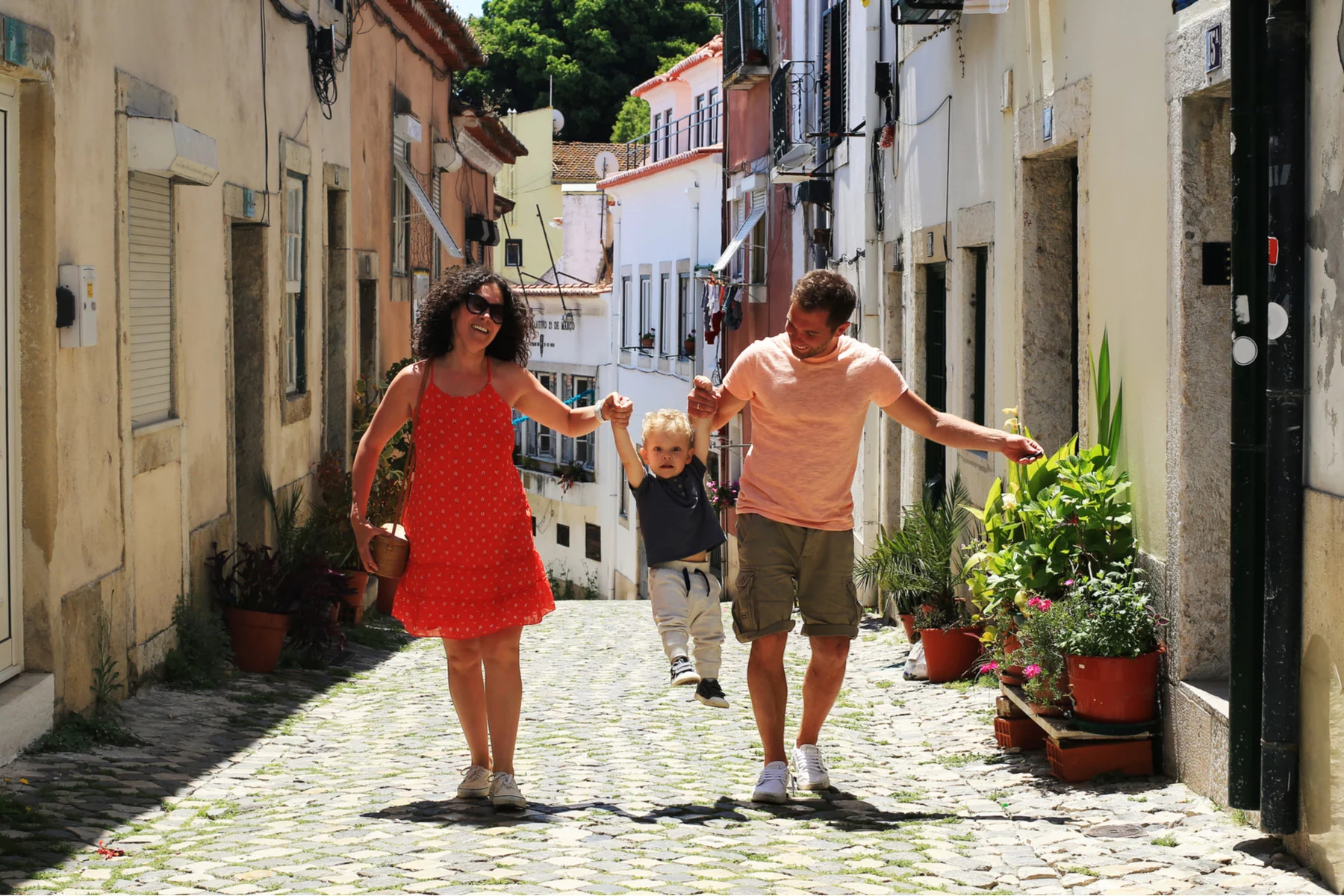
While most births still occur within a marriage, there is no longer a sense of shame for having children outside of wedlock. Indeed, nowadays, most couples in Portugal don’t consider marriage as a prerequisite to starting a family.
Similarly, attitudes towards remarrying, which was also once frowned upon, are changing too. In fact, many weddings in Portugal occur between people who have been married before. This largely accounts for Portugal’s high divorce rate, which was the highest in Europe in 2020 by some margin.
What types of weddings are possible in Portugal
Couples getting married in Portugal can choose either a Catholic or civil ceremony. For other religions, a civil ceremony needs to occur first so that the wedding can be legally binding. Only registrars or priests can conduct a wedding in Portugal. While there are a few English-speaking priests, you will most likely need a translator to conduct the ceremony on the day. The same applies to civil ceremonies, which must be held in Portuguese.
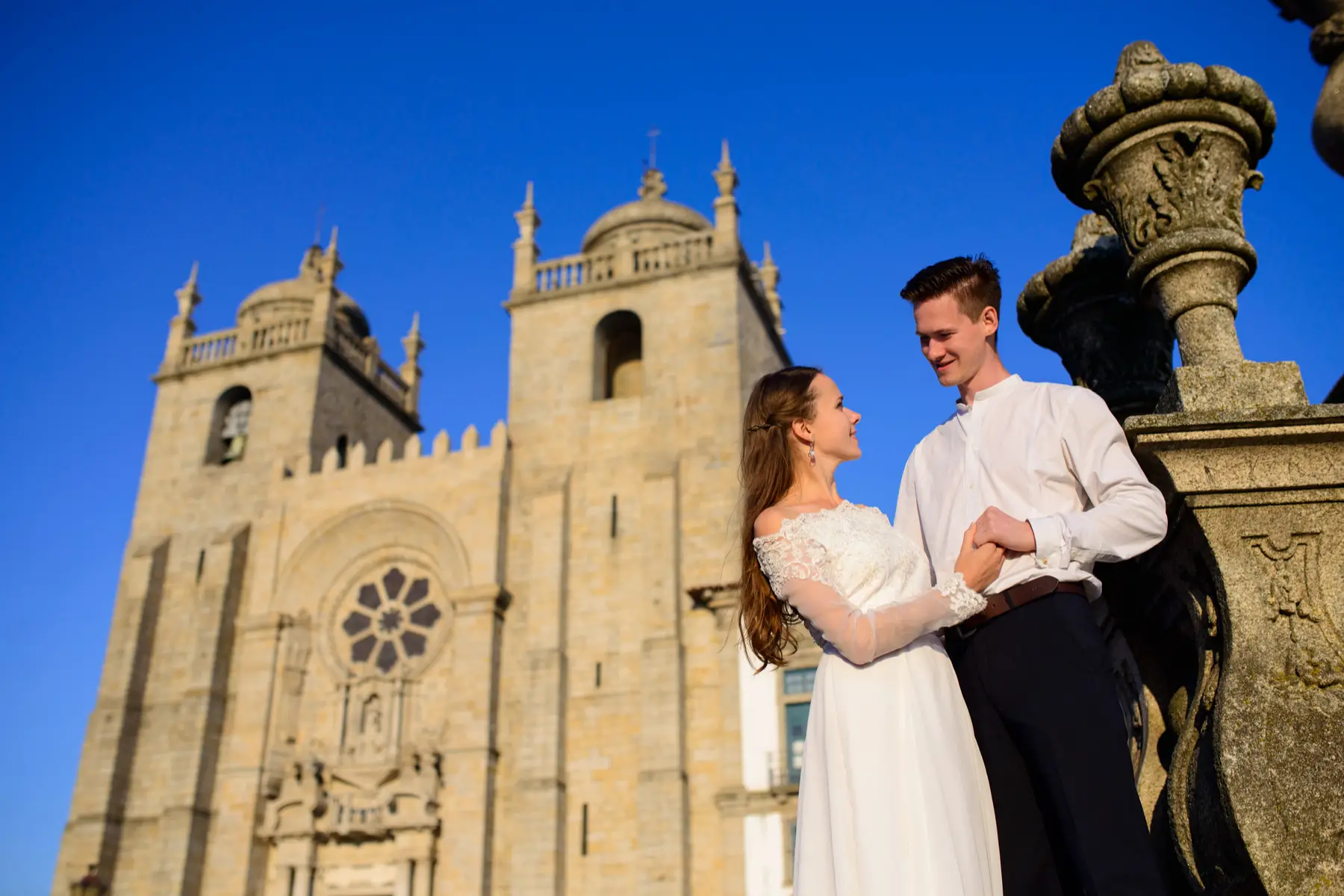
Because civil ceremonies are increasingly more popular than Catholic ceremonies, which take place in a church, there are now more options available for couples when it comes to choosing a wedding location and venue. You can find more on that later in this guide.
The legal requirements to get married in Portugal
Getting married in Portugal can be a slow, bureaucratic process, especially when it comes to gathering all the required documents. Paperwork aside, however, there aren’t many legal restrictions for expat couples, as you will find out below.
Requirements and rights in Portugal
To host a wedding in Portugal, you need to meet a few requirements. Both parties should be at least 18 years old (or 16, provided they have written consent from the parents). Same-sex weddings and gay marriages also follow the same restrictions. And fortunately, you don’t need a legal residency to get married in Portugal.
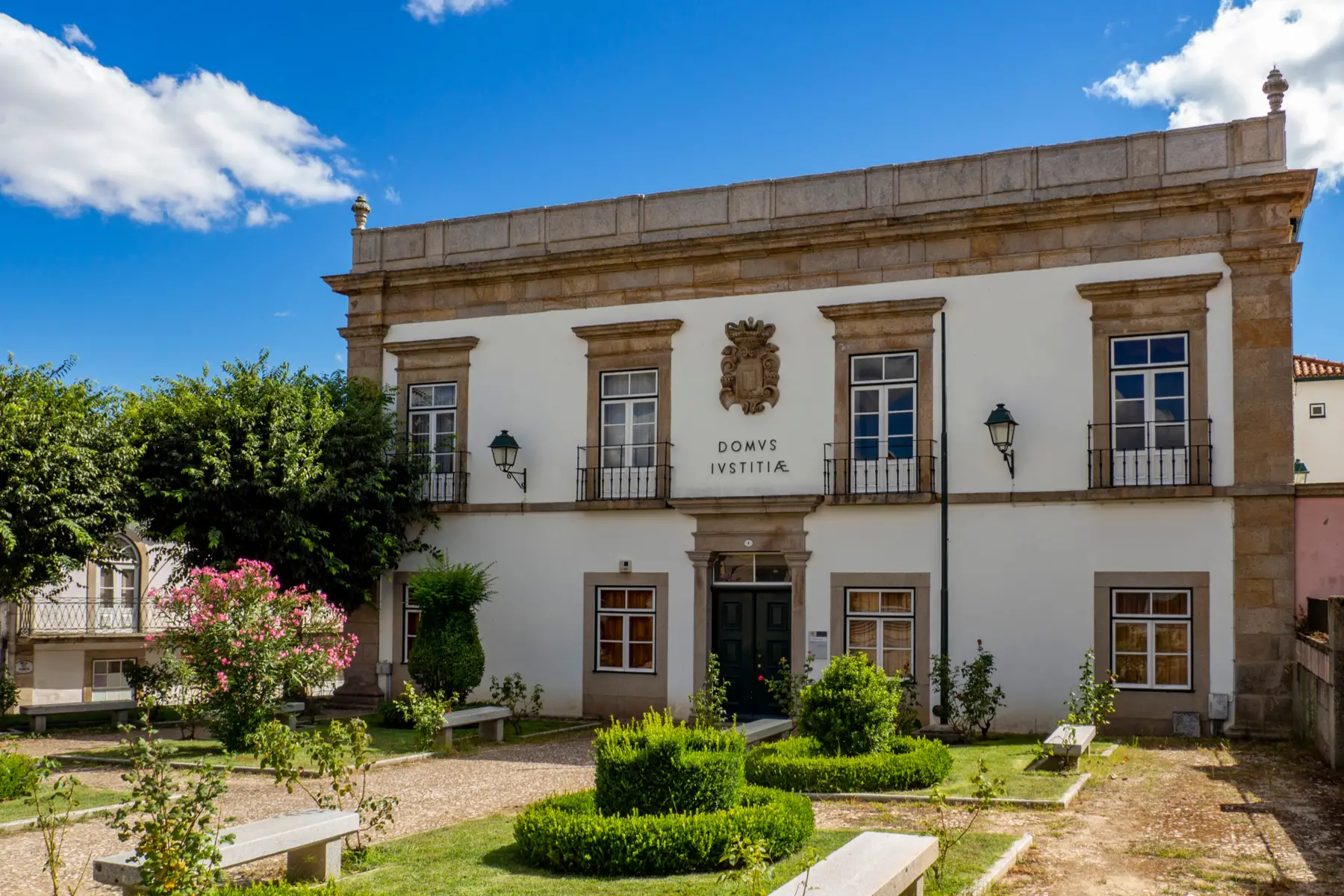
Couples should request a marriage license from one of the Civil Registry Offices (Conservatória do Registo Civil). This takes about one month to process. If you have been married before, you will need to prove that you are either divorced or that your previous partner is deceased and you are therefore free to remarry.
Applying for a marriage license
When applying for a marriage license, you should indicate the type of wedding you want to host: civil or Catholic. You will also need to include the day, time, and location of the wedding, as well as your chosen matrimonial regime. A representative with power of attorney can also initiate the process, or a priest, in the case of Catholic weddings.
Prenuptial agreements
There are three kinds of matrimonial regimes (regimes de bens) in Portugal. The default choice is a marriage in a communion of acquired property (comunhão de adquiridos). This means that the spouses only share goods and property after the wedding, whether or not these were acquired or incurred during or before the marriage.
Other types of matrimonial regimes include:
- General communion of property (Comunhão geral): All property brought into the marriage and acquired during the union is communal. It is not possible to choose this regime if one or both of the parties already have children.
- Separation of property (Separação geral de bens): There are no shared goods. Each person owns what they acquired before or during the wedding. This regime is mandatory if one of the parties is 60 years old or more.
Alternatively, couples can choose to draw up another prenuptial agreement that fits their individual needs.
Domestic partnerships in Portugal
Many Portuguese couples enter a domestic partnership or de facto union (união de facto), either before or as an alternative to marriage. If you have lived together for at least two years, you can enjoy some of the same rights as a married couple, such as inheriting the house you share and other Portuguese tax benefits. While you don’t need to register for this union, you should apply to have your taxes assessed as a couple. This is where an accountant or financial advisor can really help.

However, it is important to be aware that de facto partnerships have a few drawbacks when compared to marriages. For instance, you can’t share your partner’s surname, and if you separate, no agreement covers your acquired goods. For couples with children, fathers must also recognize the child as their own.
Gay marriage in Portugal
While same-sex partnerships have been recognized in Portugal since 2001, it was only in 2010 that same-sex marriages became legal. Since then, there have been 4,551 registered same-sex marriages in Portugal.

All married couples, including same-sex, receive the same rights regarding property, taxes, and inheritance. Since March 2016, same-sex couples are also allowed to adopt a child in Portugal, although the process can be quite tedious and takes on average three years to complete.
Planning a wedding in Portugal
Even if you are only planning a small wedding in Portugal, you will always need to collect some documents beforehand. While it is common to have a maid of honor and a best man, it is not mandatory to have a witness. Below are some things to consider before hosting your Portuguese wedding:
Getting married in Portugal: step by step
To get married in Portugal, you will first need to apply for a marriage license. You should do this at least six weeks before your chosen wedding date. Once you have it, you must get married within the next six months. Legal requirements aside, planning a wedding in Portugal is fairly similar to other Western countries.
Here is a step-by-step guide:
- 1 year out: Set up a budget and guest list, and find a place for the ceremony. If marrying in the church, request a meeting with the priest to ensure the church is free on that date.
- 10 months out: Book a venue and start looking for suppliers to hire, including caterers, florists, entertainment, and photographers.
- 8 months out: Create a wedding website, send out save the dates, and go dress-hunting.
- 6 months out: Collect all the documents to apply for the marriage license and begin your honeymoon search.
- 4 months out: Shop for wedding rings, smaller decorative items, and guest favors.
- 3 months out: Send out the invitations, book hair and makeup trials, and organize transport for your big day.
- 2 months out: Finalize the catering, music, and entertainment.
- 1 month out: Arrange the final guest list, and create a floor plan or seating chart.
- 2 weeks out: Send a shortlist to your photographer and confirm an on-the-day run sheet.
- 1 week out: Pick up your wedding outfit and start packing for your honeymoon (if you’re leaving straight away).
Necessary paperwork and documentation
You will need to submit some paperwork before you can legalize your wedding in Portugal. Both parties need to provide the following documents:
- Citizen card, passport, or residence permit
- A certified copy of your birth certificate issued within the last six months. If it is in a foreign language, it has to include a Portuguese translation.
- The affidavit of eligibility to marry, if your home country issues this kind of certificate; again, this must be translated into Portuguese.
- A baptismal certificate for weddings in the Roman Catholic Church.
- A prenuptial agreement certificate prepared at a notary office, in case you don’t want the standard matrimonial regime.
- If you were married before, you need to show a marriage certificate from that union. You will also need a divorce decree or a death certificate to prove its dissolution.
- If any of the parties is over 16 but under 18, they need written consent from their legal guardians.
Note: Remember to allow enough time to get the necessary documents translated into Portuguese. This is where a translation service can really help. Thankfully, there are a number of online platforms you can use to find the right translator for you. These include:
The cost of getting married in Portugal
Naturally, the cost of your wedding in Portugal will vary depending on the ceremony that you wish to have. That said, there are some standard administrative fees that you should expect.
The marriage license and registration, for instance, costs €120 if you choose to marry at the registry office on a working day. Ceremonies on weekends, after office hours, or in another venue cost €200. In this last case, you will also need to pay for the registrar’s travel costs which will vary.

If you decide on a matrimonial regime other than the acquired communion, there will also be more charges. It will cost €100 for one of the accepted regimes, and €160 if you want to draw up another prenuptial agreement.
Weddings in Portugal typically cost between €5,000 and €15,000. Of course, the final cost will depend on your wedding size and the services you hire.
Below is a list of average prices for a mid-sized wedding in Portugal:
- Venue hire: €3,000
- Food and drinks: €100/person
- Photos and videos: €1,000 for a photographer and/or a professional wedding videographer
- Music: €1,000 (note: DJs are cheaper than bands)
- Flowers: up to €1,000
- Wedding cake: €300
- Transport: €300
- Hair and makeup: €200
In Portugal, it is common to present VAT tax (23%) separate from the service price, so keep that in mind when booking your suppliers.
Popular wedding locations and traditions in Portugal
With glorious sunny days for most of the year, Portugal is an ideal destination for weddings. And once you have covered all the administrative tasks, you can focus on the fun part – finding the right venue, choosing your ceremony style, and perhaps marrying in some local traditions, too.
The best wedding locations in Portugal
Between beaches, palaces, and rural estates, couples are spoilt for choice when it comes to getting married in Portugal. Most weddings in the country take place in Lisbon. However, many couples prefer venturing further out to Sintra, a small picturesque town with stately palaces surrounded by mountains.
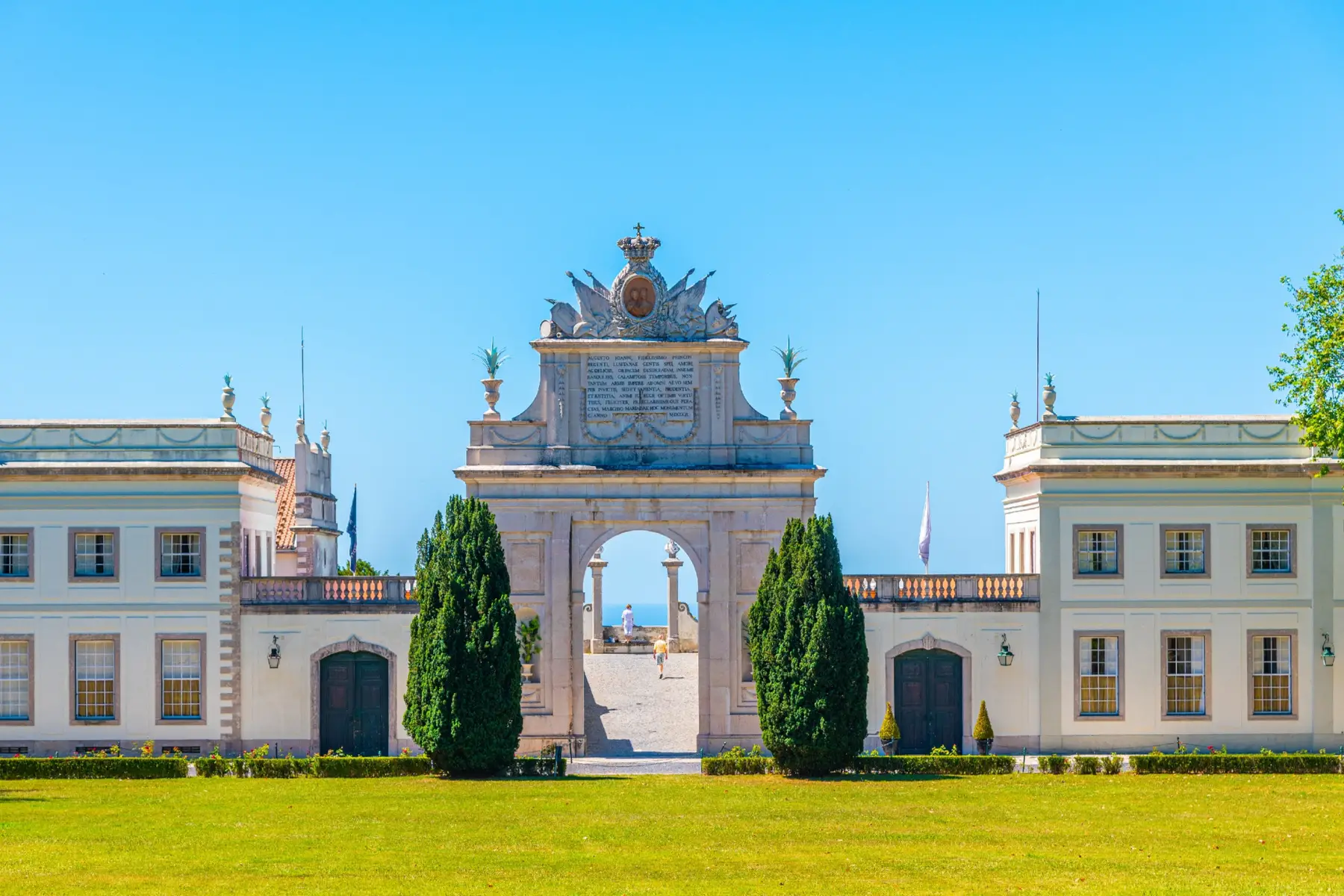
This includes Palácio de Seteais – a neoclassical palace converted into a luxurious boutique hotel – and the five-star Penha Longa Resort, where guests can mingle between gardens and romantic ballrooms. If you wish to have a Catholic service, you can book their stunning 16th-century chapel. Or better still, you can marry on the terrace of a former royal palace, the Palácio Nacional da Pena, with a privileged view over the Sintra mountains.
In the North of the country, the home of Port wine – Porto – stands out with its riverside location and surrounding vineyards. Meanwhile, down south, Alentejo draws couples to its quiet countryside. And of course, there’s always the coast. Whether it’s the wild beaches of Alentejo or the hidden coves of the Algarve, the ocean provides the perfect backdrop to any wedding. And, if you can’t decide between beaches and mountains, then the breathtaking islands of Madeira and the Azores are just a flight away.
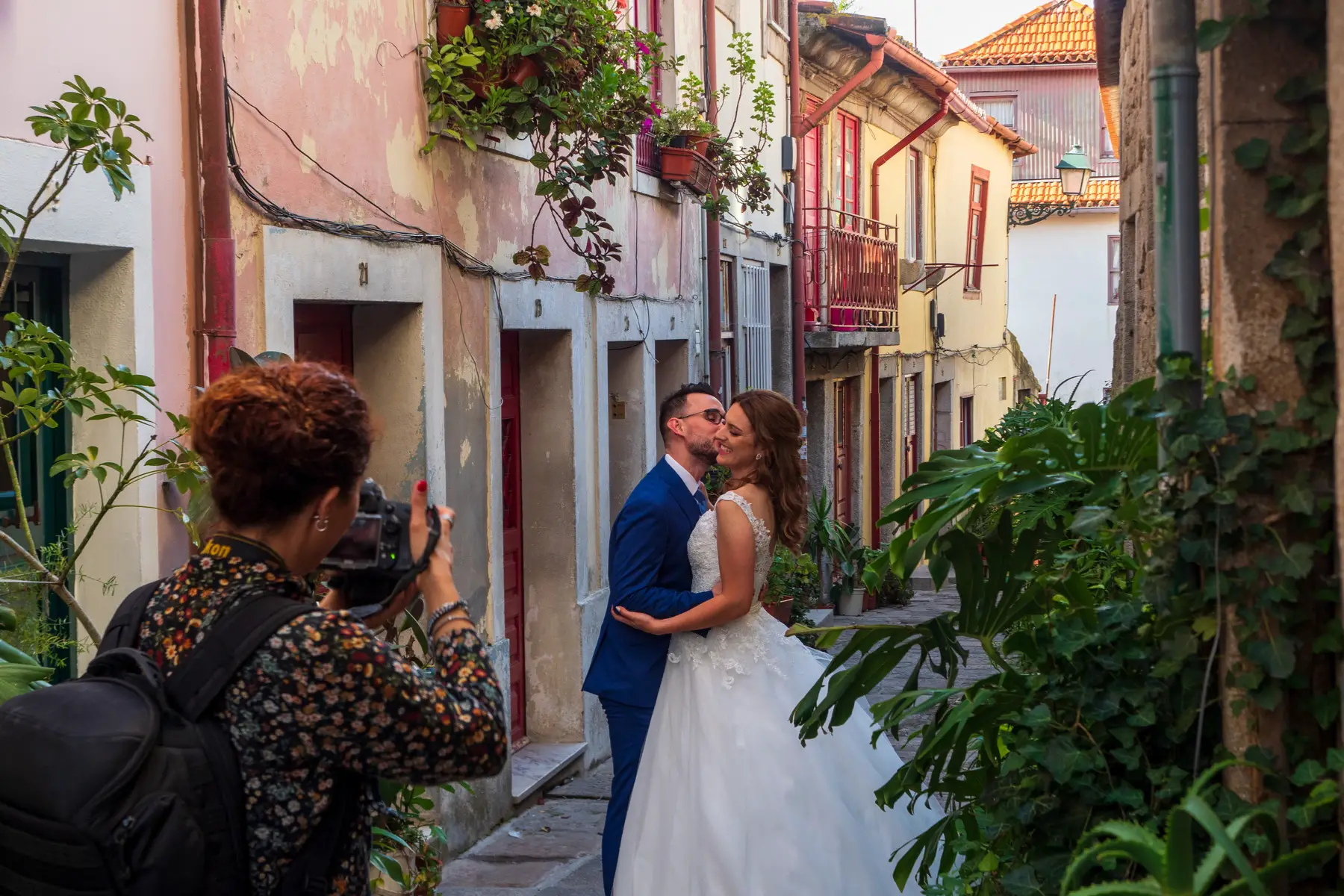
With so many beautiful wedding destinations on offer in Portugal, it comes as no surprise that most Portuguese couples choose to celebrate their wedding in their own country and save their budget for a honeymoon overseas. The diverse landscape of the country also makes Portugal a favorite spot for destination weddings with many international couples choosing to tie the knot there.
Portuguese wedding traditions and customs
Portuguese weddings follow many of the same traditions and customs as other Western countries. For instance, there’s no peeking at the dress before the big day, the father walks the bride down the aisle, and the bride throws the bouquet in the air for one lucky guest to catch.
That said, like every country, Portugal has its own unique wedding traditions and customs which many couples continue to honor today. Below are some of the most common ones.
House welcoming
Before the wedding service, a couple typically hosts a reception at their house or their parent’s home. There is a separate function for the groom and the bride. After enjoying a session of canapés, guests receive a piece of tulle (fine mesh net) fabric to place over their cars. They then escort the bride and groom to the wedding venue, usually honking along the way.
Rice throwing
As soon as the ceremony ends, guests gather outside to throw rice grains at the newlyweds. This is a symbol of good luck, fertility, and prosperity. These days, however, many people are replacing rice with confetti or flower petals which are more environmentally friendly; not to mention less painful!
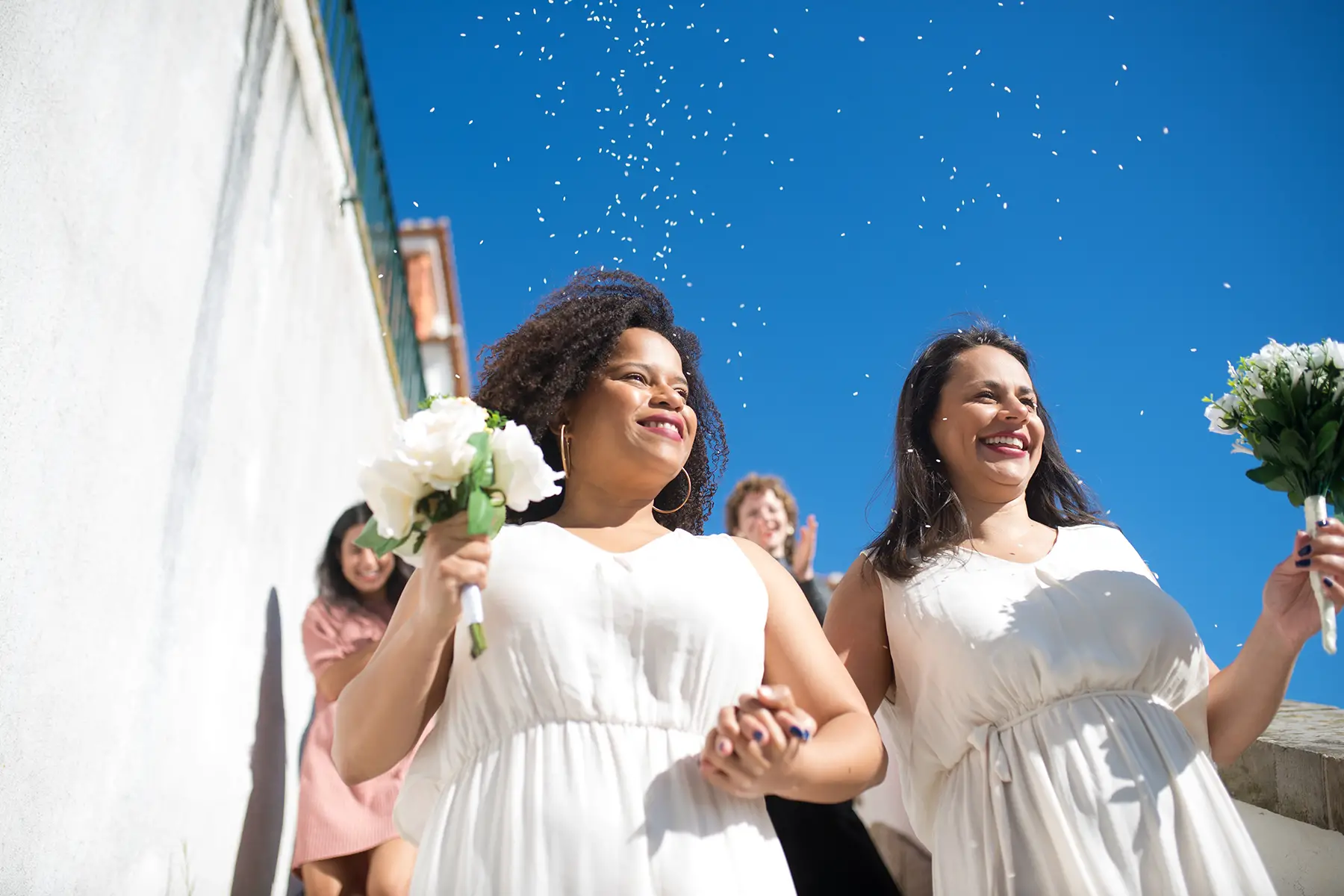
Wedding reception
If there is one thing you can expect at a Portuguese wedding it’s being showered with food. At the reception, guests get pampered with more appetizers before the main meal. This includes a starter, a fish course, and a meat course, followed by a sea of typical Portuguese desserts. The couple usually moves to another location for the ceremonial cake-cutting, and guests follow along.
Dance and dinner
While there are little speeches at a Portuguese wedding, there’s always a bit of action on the dancefloor. Traditionally, the first dance was between the bride and her father, who would then give her away to the groom. Lately, however, it’s the newlyweds that kick it off. On the wedding playlist, there’s usually one song made for a conga-style dance known as the comboio (train). And to recharge your batteries, there’s often a late-night supper where they serve caldo verde; a delicious, heart-warming green soup made from potato, onion, thinly-sliced kale, olive oil, and chorizo sausage.
Luck in Portuguese weddings
As strange as it sounds, tying the knot on a rainy day is a sign of good luck in Portugal. In fact, there is even a Portuguese saying that goes “casamento molhado, casamento abençoado”, which means “wet wedding, blessed wedding”. Of course, you can’t predict the weather, and many couples prefer to stay dry on their special day.
Useful resources
- ePortugal – provides information about getting married or entering into a de facto union in Portugal
- Perfect Weddings – discover the best wedding venues in Portugal
- Wedded Wonderland – discover some ancient wedding customs that you might still see at a Portuguese wedding
